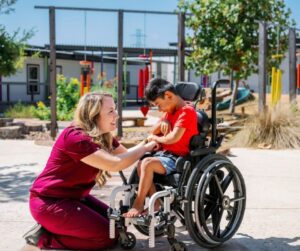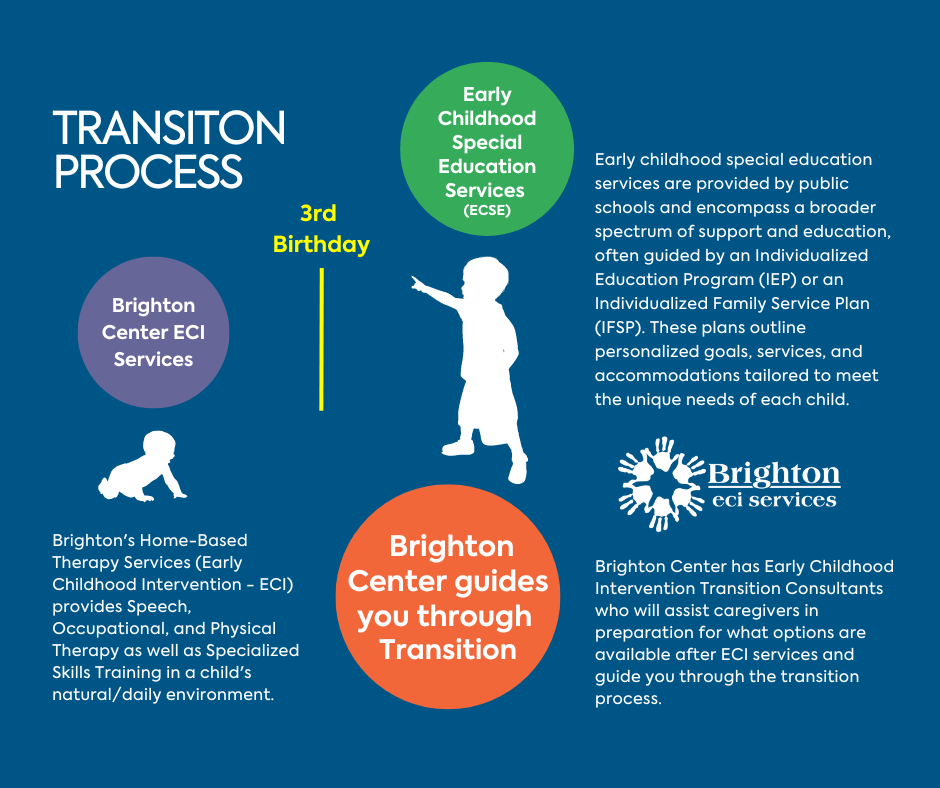In the journey of nurturing children with developmental delays, disabilities, or special needs, families often encounter a pivotal transition from early childhood intervention therapies to early childhood special education services provided by public schools. This transition to special education services marks a significant milestone in a child’s educational and developmental path, offering a myriad of benefits that contribute to their growth, learning, and overall well-being.
Understanding the Transition Process
Before delving into the benefits, it’s essential to understand the transition process itself. Brighton Center’s Early Childhood Intervention (ECI) therapies typically cater to children from birth to three years old. These services focus on addressing developmental delays and providing interventions. These interventions can include speech therapy, occupational therapy, physical therapy, and developmental support through Specialized Skills Training.
As children approach the age of three, they may transition from ECI to Early Childhood Special Education (ECSE) services provided by public schools. Early childhood special education services encompass a broader spectrum of support and education, often guided by an Individualized Education Program (IEP) or an Individualized Family Service Plan (IFSP). These plans outline personalized goals, services, and accommodations tailored to meet the unique needs of each child while attending public school.
Brighton Center has Early Childhood Intervention Transition Consultants who will assist caregivers in preparation for what options are available after ECI Services and guide you through the transition process.
The Benefits of Transitioning Your Child to ECSE with Public School Services
1. Comprehensive Educational Framework
Early childhood special education services offered by public schools provide a comprehensive educational framework that extends beyond therapy sessions. Children have access to structured learning environments, specialized instruction, and curriculum modifications designed to support their cognitive, social, emotional, and physical development.
2. Seamless Continuity of Care
Transitioning to early childhood special education services ensures a seamless continuity of care for children and families. It allows for the integration of therapeutic interventions with educational goals within a familiar setting, fostering consistency and stability in the child’s learning environment.
3. Access to Qualified Professionals
Public schools employ a team of qualified professionals, including special education teachers, speech-language pathologists, occupational therapists, physical therapists, and behavioral specialists. These professionals collaborate to assess, plan, and implement individualized interventions that address the child’s unique strengths and critical areas of need.
4. Inclusive Learning Environments
Early childhood special education services promote inclusive learning environments where children with diverse abilities learn, play, and grow together. Inclusive settings encourage social interaction, peer modeling, and acceptance, fostering a sense of belonging and mutual respect among all students.
5. Family Engagement and Support
Public schools prioritize family engagement and support throughout the transition process and beyond. Families are actively involved in the development of their child’s IEP or IFSP, participating in meetings, setting goals, and making informed decisions about their child’s education and services.
6. Holistic Developmental Approach
Early childhood special education services embrace a holistic developmental approach that addresses the child’s overall well-being. In addition to academic skills, emphasis is placed on fostering independence, self-advocacy, communication skills, social-emotional competence, and functional life skills essential for success in school and beyond.
7. Advocacy and Rights Awareness
Transitioning to early childhood special education services empowers families with greater advocacy skills and awareness of their child’s rights under the Individuals with Disabilities Education Act (IDEA). Families gain valuable knowledge about procedural safeguards, dispute resolution options, and community resources available to support their child’s educational journey.
8. Preparation for Future Transitions
Participation in early childhood special education services prepares children and families for future transitions, such as the transition to elementary school and beyond. It equips children with foundational skills, adaptive strategies, and self-confidence necessary to navigate new environments, routines, and social dynamics successfully.
 A Transformative Opportunity for Your Child
A Transformative Opportunity for Your Child
The transition from early childhood intervention therapies to early childhood special education services represents a transformative opportunity for children with developmental delays or disabilities and their families. It embodies a collaborative partnership between families, educators, therapists, and community stakeholders dedicated to supporting each child’s unique journey toward achieving their full potential.
By embracing the benefits of transitioning to early childhood special education services, children are provided with the tools, resources, and support needed to thrive academically, socially, and emotionally. As we champion inclusivity, equity, and access to quality education for all children, let us continue to celebrate the remarkable progress and achievements made possible through early intervention and specialized support services.
In the tapestry of early childhood education, the transition from intervention to special education signifies not only a milestone. In fact, it’s a testament to the unwavering commitment to every child’s right to learn, grow, and shine brightly in the world.
Brighton Center’s Transition Program
Brighton Center has Early Childhood Intervention Transition Consultants who will assist caregivers in preparation for what options are available after ECI services and guide you through the transition process. A huge part of the transition is preparing for your child’s special education evaluation with the public school system.
The evaluation is essential for ensuring that the transition process is thorough, informative, and beneficial for both the child and the family. Here are several steps parents can take to prepare for their children’s special education evaluation:
1. Understand the Evaluation Process
Familiarize yourself with the evaluation process and timeline. Understand the purpose of the evaluation, the assessments involved, and the professionals who will be conducting the evaluations.
2. Gather Relevant Information
Compile relevant information about your child’s development, medical history, and educational background. Additionally, include any concerns you have about their learning or behavior. This may include previous assessments, medical records, and input from teachers or other caregivers.
3. Communicate with School Professionals
Establish open communication with your child’s school or the appropriate educational agency responsible for conducting the evaluation. Discuss your concerns, observations, and expectations for the evaluation process.
4. Advocate for Your Child’s Needs
Advocate for your child’s needs and ensure that the evaluation addresses all areas of concern. Be proactive in communicating your child’s strengths, challenges, and any accommodations or supports they may require.
5. Prepare Your Child
Depending on your child’s age and understanding, prepare them for the evaluation process in an age-appropriate manner. Explain the purpose of the evaluation. Furthermore, reassure them that it is designed to help understand their strengths and areas where they may need extra support.
6. Keep Records and Documentation
Keep detailed records of your interactions with school professionals, including emails, phone calls, and meetings. Document any concerns, observations, or recommendations provided by educators, therapists, or other professionals involved in your child’s care.
7. Participate Actively in the Evaluation
Participate actively in the evaluation process by attending meetings, providing input, and asking questions. Collaborate with the evaluation team to ensure that your child’s unique needs and strengths are accurately assessed and addressed.
8. Educate Yourself About Special Education Rights
Familiarize yourself with your child’s rights under special education law. That includes the Individuals with Disabilities Education Act (IDEA) and relevant state regulations. Understand the rights and procedural safeguards afforded to children with disabilities and their families.
9. Seek Support and Resources
Seek support from advocacy organizations, parent support groups, or educational professionals who can provide guidance, information, and resources to navigate the evaluation process effectively.
10. Maintain a Positive Outlook
Approach the evaluation process with a positive outlook and an open mind. Focus on gathering valuable information and recommendations that will help support your child’s learning, development, and overall well-being.
By taking these proactive steps, parents can play a pivotal role in ensuring that their children receive comprehensive and meaningful special education evaluations that accurately assess their needs and inform appropriate interventions and supports. Collaboration, communication, and advocacy are key elements in facilitating a successful evaluation process and promoting positive outcomes for children with disabilities.

If your child is receiving ECI Services through Brighton Center and would like to be contacted by our ECI Transition Consultants please fill out our application.
















